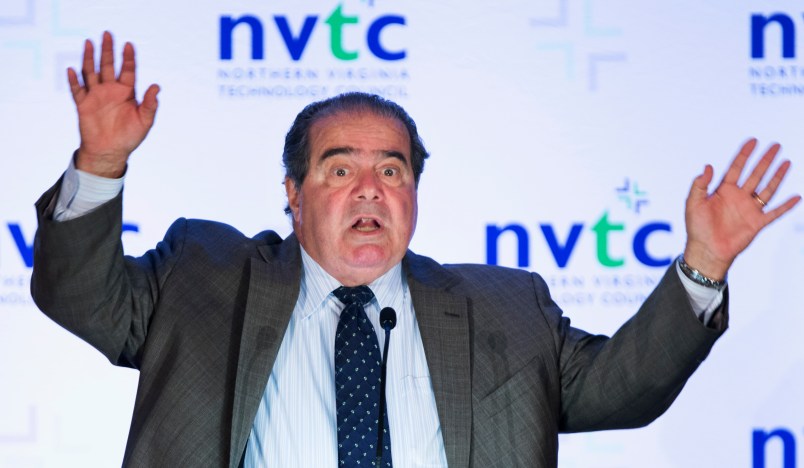Last summer, the Supreme Court handed down a landmark decision equalizing the treatment of all married couples under federal law. But it opted not to address the more fundamental question in a related case: whether gay and straight couples are entitled to equal protection on the state level, where marriage law is made.
That extraordinary dodge was seen by some experts as a disingenuous way of seeking a middle ground in the rulings on the Defense of Marriage Act and California’s ban on same-sex marriage. Dissenting Justice Antonin Scalia fumed that it amounted to “legalistic argle-bargle.” And it appears he had a point: a number of federal judges from Utah to Kentucky have concluded that the Supreme Court’s legal reasoning does not leave substantial room for state-based discrimination against gay marriage.
Recently, federal judges in Utah and Oklahoma overturned the states’ bans on gay marriage as unconstitutional, leading to chaos as gay marriage was briefly legal there before the states appealed the decisions and halted them. In Ohio, a federal judge ordered the state to recognize same-sex marriages on death certificates. And on Wednesday, a federal judge in Kentucky ordered the state to recognize out-of-state gay marriages.
“I think what’s behind it all is that when you talk repeatedly in your [Supreme Court] opinion about the dignity of gay people in relationships, how do judges rule the other way?” Roberta Kaplan, the attorney who argued against DOMA before the Supreme Court, told TPM. “What possible reason could judges use for denying equality for gay people?”
In fact, the judges “explicitly say they’re doing this because of Windsor,” she said.
Adam Winkler, a professor at UCLA School of Law, who supports marriage equality, said that “[c]ourts today are finding in Windsor strong support for the idea that denials of marriage benefits are based in anti-gay attitudes, not valid public policy goals. The Court in Windsor purposefully avoided ruling on the constitutionality of a marriage ban, so it’s not a matter of following [or] not following the Court. [Justice Anthony] Kennedy purposefully kept the window open for courts to strike down marriage bans.”
Scalia saw this coming. “In my opinion, however, the view that this Court will take of state prohibition of same-sex marriage is indicated beyond mistaking by today’s opinion,” he wrote in his barnstorming DOMA dissent. “As I have said, the real rationale of today’s opinion … is that DOMA is motivated by ‘bare… desire to harm’ couples in same-sex marriages. How easy it is, indeed how inevitable, to reach the same conclusion with regard to state laws denying same-sex couples marital status.”
Judges in Utah and Kentucky have, with a heavy dose of irony, referenced that comment by Scalia in their rulings against anti-gay-marriage laws.
Some experts note that the DOMA case was about federal law and not state law, making it unremarkable for the court to avoid the latter question. But the other case heard by the justices one day earlier, Hollingsworth v. Perry, posed exactly that question. And a majority of justices opted not to rule on the merits and instead dismissed the case on standing.
“I certainly think the justices were not that eager to jump into that question at that point,” said Judith E. Schaeffer, the vice president of the Constitutional Accountability Center, a liberal legal advocacy group. But she argued that the lower court decisions flow seamlessly from the DOMA ruling.
“The lower court decisions you’re seeing now post-Windsor … are a logical extension of the core equal protection principles,” Schaeffer said. “So I don’t find the lower court decisions surprising at all.”
What is remarkable is the speed at which the issue is making its way back up the courts. The Supreme Court’s ruling against DOMA came 10 years after it invalidated laws banning same-sex sodomy between consenting adults. Now, just months later, the issue of whether gay marriage is a constitutional right is already being heard one notch below the Supreme Court.
“It does seem fast in that sense but we’ve had such a sea change in our culture and our laws,” Schaeffer said. “Americans have been living with the reality of same sex marriage for years, and they realize the sky hasn’t fallen.”
“And between Twitter and Facebook, it’s almost like everything’s fast,” she quipped.
Correction: An earlier version of this article misstated Kennedy’s vote in Hollingsworth v. Perry. It has been updated. We regret the error.






